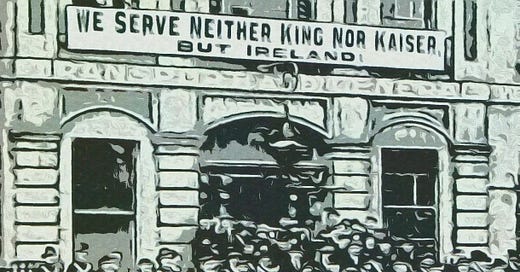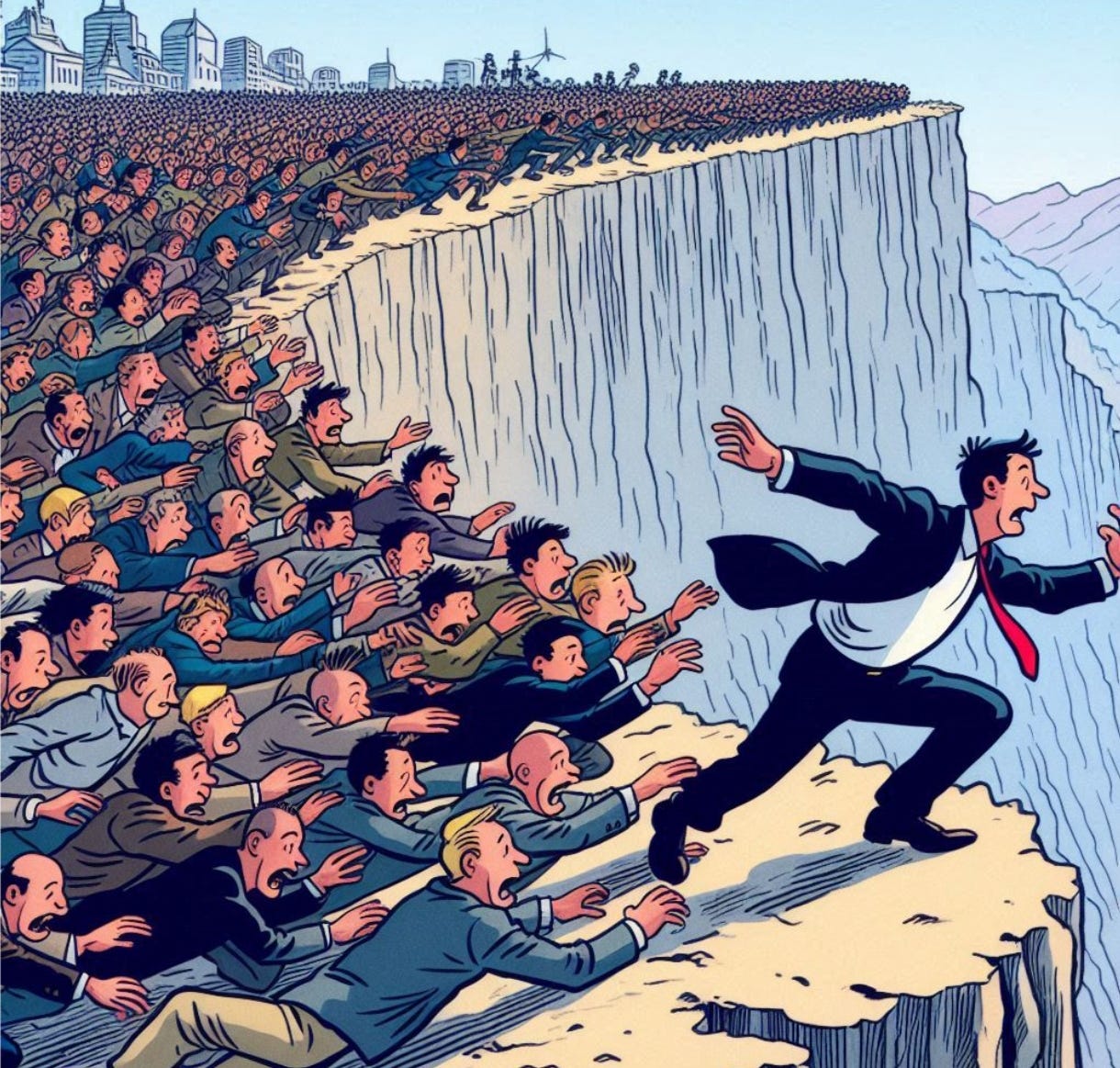“I see it all perfectly; there are two possible situations — one can either do this or that. My honest opinion and my friendly advice is this: do it or do not do it — you will regret both.”
— Søren Kierkegaard, Either/Or: A Fragment of Life
A false dilemma is a logical fallacy that occurs when someone presents a situation as having only two possible options or outcomes, when in fact there are other alternatives available. It oversimplifies the range of choices and forces a black-and-white decision in situations that are often more complex. Children might demand of those peers who haven’t yet promised a course of action, when there is a fracture in a group, "You're either with us or against us." This ignores the possibility that someone could be neutral, partially supportive, or supportive in a different way.
The false dilemma is also known as the false dichotomy fallacy, Either/Or Fallacy, Black-and-White Thinking. All-or-Nothing Thinking, the Bifurcation Fallacy, the Excluded Middle Fallacy, the False Choice and Two-Valued Thinking fallacy. For many Irish people this fallacy is partially rejected in the exhortation, “Neither King nor Kaiser but Ireland”, made by the Irish Citizen army at the start of World War 1. For the leaders of the Irish Citizen army, it wasn’t a direct choice between fighting for the King of the United Kingdom, or the Kaiser of Imperial Germany, but a third option was available; to fight for Ireland. As part of the propaganda at the time, it was put to Irishmen, “if you don’t fight for Britain, you must be a supporter of Germany”. However, many Irish intellectuals rejected this false binary, and offered an alternative. The binary was created to manipulate Irishmen to join the fight or be considered disloyal to the United Kingdom, which, at the time, included the island of Ireland.
Today we see the false dilemma fallacy raise its head in a lot of discourse. The Irish Media are notorious for engaging in fallacious thinking and in particular adopting the false dilemma fallacy. For example,
Pregnant women still ‘forced to travel’ abroad for abortions six years after abortion legalised”
— The Irish Times, April 15, 2024
This headline presents a false dilemma by implying that the only options available to pregnant women are either to travel abroad for an abortion or to access abortion services within Ireland. It oversimplifies the issue of abortion to “get an abortion or your health will suffer”, ignoring the possibility of other solutions such as improving domestic services for expectant mothers, expanding post-natal healthcare access, or implementing policy reforms to assist single or indigent mothers. By framing the situation in this binary way, the headline leads readers to overlook the broader range of potential approaches to addressing the issue of abortion which includes NOT seeking abortions in the first place. As we have discussed many times, abortion is never required to save a pregnant woman’s life but the false dichotomy presents the issue implicitly as settled. This is false and engineered to present a true dilemma between accessing services that can result in continued life or death.
Similarly, you will hear political analysts across the world implying that a person who disagrees with the pro Ukrainian narrative, it must therefore follow then that the person disagreeing must be pro Putin. To articulate a rational belief that the causes for the eastern European conflict might have as its genesis political machinations prior to 2014 tends, by some, to attach accusations of being a Putin stooge when, in truth the statement might simply be a thorough analysis of the causes of the war. To invest in this enquiry is not a cemented loyalty to Russia, it is rather, to understand why the conflict started to allow someone to pierce the veil of propaganda. Once the cause is understood, it gives the person attempting to comprehend the conflict more nuance as to how it could be resolved or at least, not to dehumanise “the enemy”. This attraction into accepting a false dilemma way of thinking allows a form of entrenched opposition to reason while also germinating dehumanizing tendencies. The resolution of false dilemma however, allows a person to look from a distance and perceive the full scope of the landscape by concluding that fault may lay elsewhere to what is being editorialised.
Recently on the Daily Mail newspaper, which is explicitly pro Ukraine, the correspondents used very dehumanizing language about Russian soldiers being killed by a drone attack (For example in an article published on the 6th of June 2022 it referred to Russians as Orcs fleeing in terror).The same newspaper would at the same time rebuke non-western societies for their lack of human rights records. Sadly, this type of behaviour is typical across the media landscape, and academia now too, which is even more disturbing.
Similarly with the Gaza conflict. People tend to be conveniently corralled into being for Palestine and Anti-Israel, or Pro Israel and anti-Palestine, or other variations which include Hamas and Zionism. As an Irish Catholic, I can appreciate that the war involves many innocent human beings being killed or maimed, and so to keep some ideological distance allows oneself to recognise that in war, it is usually the innocent that suffer, on all sides. Podcaster Daryl Cooper attempted to approach aspects of World War II by trying to understand the reasons to explain why the German population were motivated to follow Hitler. In response, journalists like Douglas Murray was incensed, believing that such a discovery might create sympathy for an ideology. Murray exclaimed that to pursue this form of historical analysis was reckless, but he completely misunderstood the mission of Cooper- am attempt to explain something is not the same as justifying it. In fact, Cooper could be criticised for not delving further into the subject and what it might reveal. Again, to do so would not be justification for any wrongdoing but it would be intellectual honest all the same ( I will discuss this issue in a future essay). What Murray fell foul was to indulge in black and white thinking, or defending a false dilemma- in this case, one must defend the allies or, one is a Hitler fan boy. There are of course alternatives, such as merely attempting to understand the past from a safe distance in the future, to list but one alternative.
This type of manipulative reportage seems ever present in Ireland when the media, without applying any definitions, apply the term “far right” to opponents of radical deracination of the Island through mass immigration. Take the coverage of the riots in Dublin in the aftermath of the stabbing of children where rioters were labelled as “far right”. The false dilemma plays out as implicit, thorough generalisation, as all present at the event are labelled “far right” and not anything else; it could easily be understood as nonpolitical youths availing of an opportunity for mischief or appalled parents who were merely protesting legally and became bystanders to the rioting. The black and white thinking employed by the media is an example of the false dichotomy approach that is an attempt at criminalising genuine political opposition.
Now, it must also be said, that not every dilemma is a false one. After all, one is either alive, or one is dead, there is no middle ground. One is a human being, or one is not, which is why pro abortionists consistently get their argument wrong because many on that side blatantly corrupt the biological certainty found in the categorisation of human speciation (upon fertilisation a new human being is created- this should not be contentious). It is important to posit that not every false dichotomy appears prima facie as a false dichotomy- it can be insidiously implied.
Returning to the Palestinian Israeli conflict, many Irish people are corralled into making a binary choice, but no choice is necessary, as there wasn’t one for the leaders of the Irish citizen army. One can harbour sympathy for innocent civilians on all sides, but it would be foolish to take sides when neither Palestinians nor Israeli’s care one jot about Ireland. We know Palestinian politicians have come to Ireland and stood on platforms of those who want the uniqueness of Ireland to disappear. I have demonstrated in a previous essay how Sinn Fein seek to destroy the homogeneity of the nation and do so openly and with vigour. Yet at the Sinn Féin Ard Fheis in 2023, the Palestinian Ambassador to Ireland, Dr. Jilan Wahba Abdalmajid, delivered a powerful address that garnered a standing ovation from delegate expressed gratitude to the Irish people for their vocal support of justice and called for accountability for war crimes committed in Gaza and the West Bank. Not once did she denounce her guests for attempting to sexualise Irish children, abort Irish children, deracinate the nation etc. Now, it could be said she had other priorities but in 2011, Fady Abusidu, a representative from Fatah's Foreign Relations Commission, attended the Sinn Féin Ard Fheis in Belfast in September of that year. During the visit, he acknowledged the longstanding solidarity between Sinn Féin and Fatah. Nowhere did Abusidu condemn the anti-Irish policies of Sinn Fein. The realpolitik explanation for Palestinian political foreign policy s is that they will seek support for where ever it is offered, and that includes a party like Sinn Fein that will achieve far more than any unionist party in destroying the entire Irish Gaelic Catholic culture on this island.
Of course, the false dilemma still applies in the logical sense without approving of the callous indifference to life performed by the Israel defence forces or the behaviour of Hamas towards civilians in Gaza or Israel. We know that Hamas have been involved in abductions and forced coercions of Christian Palestinians (for example in 2005 a Greek Orthodox woman called Huda al Dabbagh was abducted and forced to apostatize). We know with regards to Israel that the broadness of that State’s appalling behaviour is not confined to the middle east either with its exercising of near complete control of the America political establishment through AIPAC. While we hear constantly about the holocaust (over 200 movies have been produced to remind us since 1980) the same state has killed (estimated at) one million innocent unborn babies since abortion was legalised in 1978. The political duplicity of Israel is well known to many, whether it be the intentional bombing of the USS Liberty during the six-day war, or using its proxy, the USA to kill millions in the Middle East (see the illegal Iraqi War no.2). Again, it doesn’t follow, that these events should lead any moral person to tolerate the killing of any innocent human being, whether on the streets of Tel Aviv or elsewhere in Israel.
When one is deceived into accepting false binary thinking, it becomes easier to become blind and justify immoral actions of the side with which you have been manipulated into forming an allegiance. Again, it doesn’t follow that one can never demonstrate loyalty to a creed, family or nation over and above all other competing creeds, families or nations. However, with regards to the issue of national fidelity, the false dilemma tends to be produced when nationalism itself is pigeon holed as a force for evil. For example, if one were to assert one is a proud Irish nationalist the assertion tends to attach an accusation of its binary opposite; that to love your God given nation, must mean you hate all other nations. This is false. One can love one’s nation, and not hate other nations, and respect other nationalities who love their own nation. This either/or fallacy derives from a fallacy of association that falsely associates all acts of love for one’s nation as comparable to rogue expansionist nations, detailed in history, that sought to conquer other nations. As of 2025, there are 195 nations recognised by the international community. By far, most countries, upon attaining nationhood, have not engaged in aggressive wars of expansion. Most peoples want to simply to maintain their culture, live in peace, and allow others to do the same. Nevertheless, those who seek to repress nationalism create a false binary of being nationalist and therefore aggressive, or not, and peaceful. The former begs the question that nationalism is equal to aggressive expansionism- this is clearly false, some nations are expansionist, the vast majority are not and are peaceable.
This has become very important with regards to media manipulation because the mass media present an either/or fallacy that begs the question, associating nationalism with xenophobia; but this is intentionally distorting because it confuses maintaining an integrity of one’s border, protection of sovereignty all oriented towards the defence of the nation, with irrational hatred of outsiders. The castles of old, dotted around Europe contained walls precisely because it was generally understood that to be defensive was a realistic response to the imperfection of man. Today, we close our doors at night, and even liberals will ensure their car is safely locked, because of the realisation that men can and do commit crimes, motivated by the basest of desires (wealth and power). It never followed that walled cities or castles of old were bastions of xenophobia, why? because those who erected the, recognised that the vices of the powerful could never be satiated with what they have, but rather what others can provide them with. The liberal of today will present an ‘all or nothing’ dilemma, a society of intrusive state control or open borders. But there is another option that involves neither of the aforementioned- full sovereignty.
Every variation of the false dilemma, whether it is the either/or, black and white thinking, or all or nothing, can fall prey to the manipulators who want to deceive you into thinking that there are never alternatives. Sometimes, there are.
In Nathaniel Hawthorne's novel, The Scarlet Letter (1850) one of the most famous false dilemmas appears in the predicament of Hester Prynne, the female protagonist. The character Reverend Arthur Dimmesdale says to her as she stands on the scaffold accused of adultery awaiting execution,
"‘Be not silent from any mistaken pity and tenderness for him; for, believe me, Hester, though he were to step down from a high place, and stand there beside thee, on thy pedestal of shame, yet better were it so, than to hide a guilty heart through life. What can thy silence do for him, except it tempt him — yea, compel him, as it were — to add hypocrisy to sin?’"
— Nathaniel Hawthorne, The Scarlet Letter, Chapter 2, "The Market-Place"
In this scene, Reverend Dimmesdale urges Hester to reveal the name of her lover (who is Dimmesdale himself) framing her silence as not only an act of selfishness but as a moral wrong that will compel the man to live a life of hypocrisy. The implication here is that Hester has only two options: Reveal the man’s name, which would allow him to escape the guilt of secrecy and face public judgment alongside her or remain silent, which would not only be a sin but would somehow force the man to live in hypocrisy.
The false dilemma is revealed in the fact that Hester is seemingly presented with no other choice — there’s no consideration of the possibility that she could choose not to reveal the name for her own reasons (e.g., to protect her lover or to preserve her own moral integrity) without being condemned as a sinner or forcing Dimmesdale into hypocrisy. The community and Dimmesdale reduce her complex situation into a binary choice, when, in fact, there are other potential paths for her.
This scene beautifully captures the pressure of the false dilemma, highlighting how Hester is being manipulated into believing she has no option but to reveal the truth or live in perpetual shame, when other choices might exist for her.
In the end, Hester collapses the dilemma by her adoption of another alternative that is similar but with difference consequences. This alternative choice, while it aligns with one side of the apparent binary, is not passive — she turns silence into a form of active resistance. Over the course of the novel, this silence evolves into an alternative path, one of redemptive transformation and therefore, becomes a valid third option. She says,
“I will not speak!” answered Hester, turning pale as death, but responding to this voice, which she too surely recognized. “And my child must seek a heavenly father; she shall never know an earthly one!”







